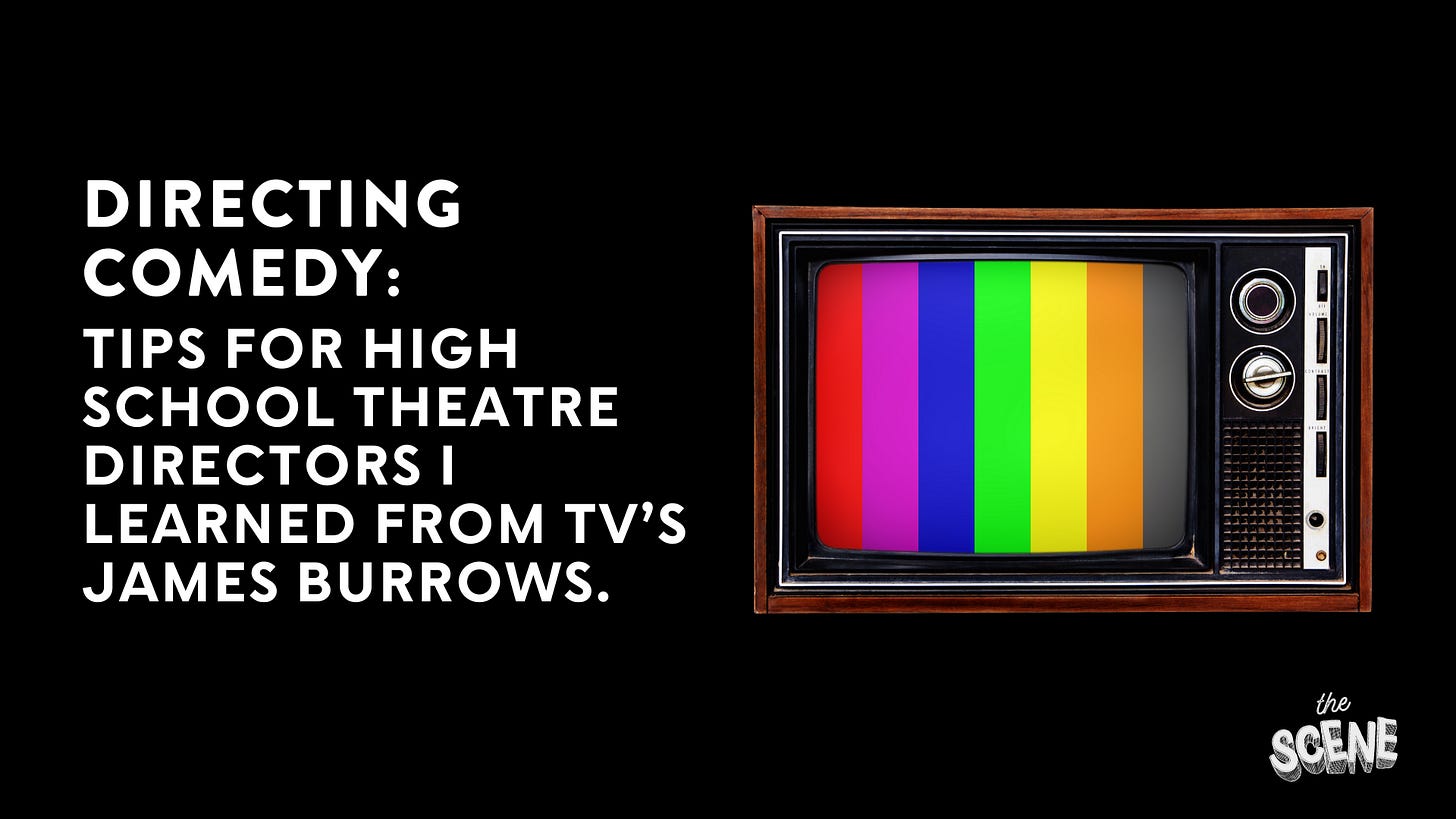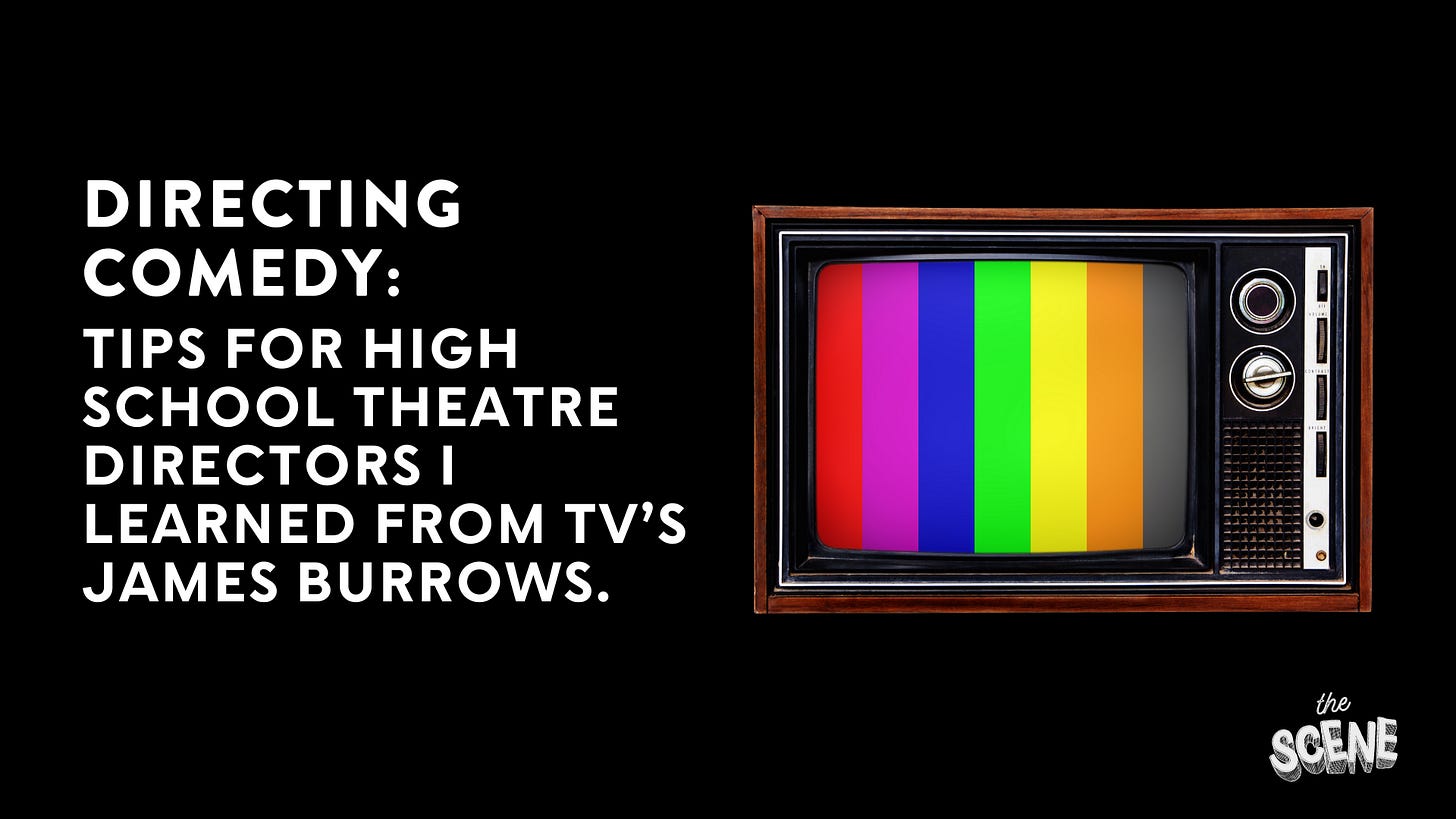Directing Comedy: Tips for High School Theatre Directors I learned from TV’s James Burrows.
Plus, your weekly round-up of theatre news you may have missed!
Welcome to The Scene, your weekly round-up of theatre news you may have missed. In this week’s email,
Zach Dulli shares tips on directing comedy from the Greatest Television Director of All Time, James Burrows (Cheers, Friends, Will & Grace).
Don’t forget to check out this week's free read, ‘MEDEA,’ adapted by Nelly E. Cuellar-Garcia!
So, raise the curtain, shine the spotlight, and dive into another thrilling week in the theatre world. Welcome to The Scene.
The Tony Awards Are Headed Back to Radio City Music Hall in 2025 by Logan Culwell-Block, Playbill | The date for Broadway's biggest night in 2025 has been revealed. Read...
Off-Broadway's Public Adds New Jocelyn Bioh, ‘Skin of Our Teeth’ Musicals to 2025 Slate by Logan Culwell-Block, Playbill | Saheem Ali will direct Goddess, featuring a book by ‘Jaja's African Hair Braiding's’ Bioh and songs by Michael Thurber. Read...
Insurrection Drama ‘Fatherland’ Opens Off-Broadway by Logan Culwell-Block, Playbill | Conceived and directed by Stephen Sachs, the work follows an 18-year-old who turned in his father to the FBI via real-life public statements and court transcripts. Read...
The Top 20* Most-Produced Playwrights of the 2024-25 Season by Rob Weinert-Kendt, American Theatre Magazine | Kate Hamill and Rajiv Joseph tie for the top spot on a diverse list of dramatists and adaptors. Read...
New Pilot Program from the National Endowment for the Arts will award $12 Million in Grants by Michael Abourizk, Broadway News | The grants will fund specific projects at nonprofits dedicated to increasing arts access. Read...
Rob Marshall Will Direct Updated ‘Guys and Dolls’ Movie Musical by Margaret Hall, Playbill | Marshall is joining forces with producer John DeLuca and screenwriters John Requa and Glenn Ficarra for the TriStar film. Read...
On City Strolls, ‘Fat Ham’ Writer Was Inspired by ‘Ghosts of Absence’ by Salamishah Tillet, The New York Times | Walking around downtown Philadelphia, James Ijames reflected on his new play, “Good Bones,” gentrification and the absence that “haunts the cities.” Read...
Directing Comedy: Tips for High School Theatre Directors I learned from TV’s James Burrows.
By Zach Dulli, The Scene
Directing high school theatre can feel like a Herculean task, especially when it comes to directing comedy. Guiding seasoned actors in delivering punchlines with finesse is one thing, but getting a group of teenagers to understand comedic timing and the truth behind the humor is a whole different challenge. Yet, if one person has mastered the art of transforming scripts into genuine laughter, it’s the legendary television director James Burrows. For those who may not know, Burrows is the creative mastermind behind some of the most iconic TV shows ever, including Taxi, Cheers, Frasier, Friends, Will & Grace, and many more. He’s a Yale School of Drama graduate and the son of Abe Burrows, the celebrated librettist behind ‘Guys and Dolls’ and ‘How to Succeed in Business Without Really Trying.’
Years ago, I had the privilege of shadowing Burrows on the short-lived CBS series ‘The Class.’ The experience was transformative, and the lessons I learned from this 47-time Emmy nominee about directing comedy have stayed with me ever since. Here are some invaluable tips from Burrows himself that will help bring out the best in your next high school comedy production.
Find the Truth in Every Scene
During rehearsals, Burrows often quietly leaned over and asked me, “Hey Zach, Did you believe it?” He wasn’t concerned with whether the scene was funny yet; he focused on believability. If a moment felt contrived or forced, he’d intervene, guiding the actors to find the honest truth in the scene. This is the bedrock of good comedy: an unshakeable commitment to the truth of the moment, no matter how absurd the situation might be.
For high school directors, this means moving beyond the surface of the script. Teach your students to ask themselves if their characters’ actions and reactions feel real, even in a heightened comedic context. Encourage them to dig deeper into their characters’ motivations. Why is this moment happening? What does the character want? Once they understand that, the comedy will emerge naturally.
It’s All About Rhythm
At times during filming, I would see Burrows with his eyes closed, listening intently to the rhythm of the dialogue. Comedy is a symphony of words, beats, and pauses. In high school theatre, students may rush through lines or stretch them out too long, losing the inherent rhythm that makes comedy sing. As a director, your job is to become a conductor of sorts, helping your young actors find that sweet spot where timing and delivery converge to create laughter.
During rehearsals, try an exercise: have your students close their eyes and just listen to the scene being read aloud. Let them feel the rhythm, the ebb and flow of conversation. Then, have them perform it again, this time with their eyes open, trying to maintain that same sense of musicality in their delivery.
Be a Director, Not a Traffic Cop
Burrows didn’t like directors who acted like traffic cops. In other words, don’t just focus on blocking and movement. Instead, get your actors up and running the scene as soon as possible. After the first read-through, let them explore. Let them try new things. High school actors often need to get out of their heads and into their bodies to truly discover the comedy within the scene.
Encourage improvisation and experimentation—yes, even when rehearsing a scripted comedy. It’s in these spontaneous moments that some of the best comedic gems are found. Be open to new ideas and foster an environment where your students feel safe to say, “What if we tried it this way?” This is how Burrows created a supportive, collaborative atmosphere on set, and it’s just as crucial in a high school theatre setting.
Create Multiple Options Before Locking in Choices
Before locking down a scene, Burrows would work with the actors to create multiple options. This approach is invaluable, especially when working with young actors who might not yet have the experience to know what works best. Run the scene in different ways: try it fast, slow, big, small. Explore every possibility. Then, collectively decide which version feels the most truthful and funny.
This method not only enhances the final performance but also empowers students. It gives them ownership of the creative process, making them feel like contributors rather than mere executors of your vision. And when they feel invested, they’ll take greater risks, leading to richer, more authentic comedy.
Foster a Supportive Environment
One of the most remarkable things about Burrows’ work on The Class was the camaraderie among the cast. Despite being a relatively new ensemble, they supported each other, contributing ideas and sharing in the creative process. This atmosphere was no accident; it was cultivated by Burrows’ calm leadership style, which valued every voice, nurtured collaboration, and didn’t waste anyone's time.
In high school theatre, creating a supportive, calm, inclusive environment is key. Encourage your students to listen to each other’s ideas, to offer constructive feedback, and to celebrate each other’s successes. This kind of environment not only makes the rehearsal process more enjoyable but also translates into a more cohesive and compelling performance.
The Economy of Comedy
When directing high school comedy, focus on the economy of the humor. Ask yourself: what’s the shortest distance between the character and the laughter? Sometimes, a line or a moment can be funny on its own, but if it’s surrounded by unnecessary fluff, that dilutes its impact. Don’t be afraid to tighten moments that don’t serve the scene. It’s not about getting through the play faster but making every second count.
In the End, It’s All Theatre
“What I do is theater,” Burrows said. “Theater that I film for television.” This sentiment holds a powerful truth for high school directors. Whether your stage is a multi-million-dollar television soundstage or a modest high school auditorium, the principles are the same. It’s about connecting with the audience through the authenticity of the performance. It’s about guiding your actors to find the truth, embrace the rhythm, and trust in the collaborative process.
So, as you embark on your next high school production, remember the wisdom of Jim Burrows. Don’t just direct your students; inspire them to discover the truth in every moment, to play with courage and curiosity, and to find the laughter that comes from a place of genuine connection. After all, that makes comedy—and theatre—genuinely unforgettable.
See Who's Starring in London Stage Adaptation of ‘Ballet Shoes’ by Andrew Gans, Playbill | Katy Rudd will direct Kendall Feaver's stage version of Noel Streatfeild’s best-selling book at the National. Read...
Stephen Sondheim's ‘Here We Are’ to Play London's National Theatre by Margaret Hall, Playbill | The musical will be a cornerstone of Rufus Norris' final season leading the National. Read...
See Who's Joining Sigourney Weaver in West End ‘The Tempest’ by Logan Culwell-Block, Playbill | Jamie Lloyd is directing the revival, part of a season of Shakespeare at London's Theatre Royal Drury Lane. Read...
World Premiere of ‘My Best Friend's Wedding’ Musical Begins at Ogunquit Playhouse by Logan Culwell-Block, Playbill | Krystal Joy Brown, Matt Doyle, Telly Leung, and more star in the new work, which sets the story to the songs of Burt Bacharach and Hal David. Read...
Anna D. Shapiro Has Wanted to Direct ‘Noises Off’ For Years. Now She's Doing It At Steppenwolf by Emily McClanathan, Playbill | The famed Chicago company may be known for its intense dramas. But its season opener shows it can excel at comedy. Read...
Adam Kantor, María Bilbao, Nate Promkul Will Lead Tick, Tick...BOOM! at Actors' Playhouse by Andrew Gans, Logan Culwell-Block, Playbill | Andy Señor Jr. will direct the new production of the Jonathan Larson musical at the Miami venue. Read...
Free Reads of the Week
Read entire plays for free! Playscripts offers a selection of full-length and one-act plays that you can access for free, which is ideal for use in theatre productions, school performances, or competitions. To explore these titles, click on the cover image below or select the "READ FOR FREE" button at the bottom of this section. This action will direct you to the play's page on the Playscripts website. Once there, click "READ NOW" to begin enjoying the play immediately!
MEDEA, adapted by Nelly E. Cuellar-Garcia
The Story: Deaf to the warnings of her nurse and chorus, grief-stricken Medea seeks solace in destroying Jason, her unfaithful husband. She ruthlessly severs her husband's lineage only to find herself "alone and forsaken" alongside the man she condemned to desolate solitude. A condensed adaptation of the classic tragedy that effectively explores Medea's disjointed psyche within the context of ancient Greek values.
Drama | 35 - 45 minutes | 13 W, 2 M, (11-27 actors possible: 9-21 W, 2-6 M) | Content Notes: Adult content | Set: Unit set













Thanks for the great article about James Burrows! On another note, how the hell do you “update” Guys and Dolls?! Are they going to try to pass the Bechdel Test? ☺️ (Don’t get me wrong, I’ll be first in line to see it…)